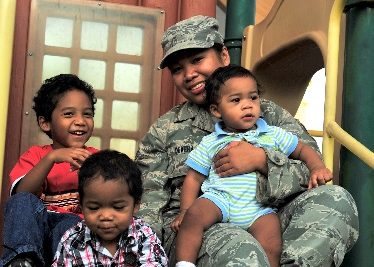“Parental wartime deployment can be distressing for a child, regardless of their age. These children are at an increased risk for social, emotional, and behavioral problems, especially if there are preexisting psychological issues in the family” (Siegel, B. S. and Davis, B. E., 2013).
What Parent Centers Need to Know to Help Military Families
Step back a minute and remember a time in your own life when something negative has happened. Maybe a lost job, a family pet died, unwanted job transfer, poor health news, etc… Did this impact only one person, or the entire family? At differing levels, a stressful time or event changes each and every member in the family.
An infant or toddler may not understand what is happening around them, but they can feel the tension or stress in the parent, sibling or family as a whole. What is known is that a child’s “early development depends greatly on the health and well-being of their parents” (National Research Council (US) Division of Behavioral and Social Sciences and Education, 2001). When parents are stressed and unhappy, the youngest children in the family are directly affected, even if they have been sheltered from the trauma or situation.
The reality is that younger children do not recognize trauma or crisis on their own, but they watch their parents or older siblings for their reactions to unexpected situations. For example: when Ryan, age two, sees mom crying when she talks on the phone with daddy he knows something is wrong. Will he understand daddy is in Afghanistan and what that entails? Of course not, but he knows mom is sad, therefore Ryan is unsettled. How this manifests in a two year old can be very different from how mom manifests her sadness.
A research study completed in 2008 revealed that preschoolers with parents who were deployed were more anxious and depressed, with an increased early reaction time to stress, and sleeping difficulties. Additional symptoms might be stomach aches, headaches, irritability, insomnia or excessive sleepiness. Some children with low immune systems may even exhibit fever with stress.
Some symptoms such as irritability may be difficult to see in a two-to-three-year old, as acting out can be developmentally age appropriate. Since these symptoms or behaviors can also signal illness, parents should talk with their child’s pediatrician before deciding that the issue might be stress. If illness is eliminated the adult family members may want to think about how any stress is affecting the family as a whole.
Families may not be aware that therapy for infants and toddlers can be helpful, and is available through the Early Intervention Program in their state. Other family members will also benefit from referrals to help them manage stress.
A note on PTSD: PTSD hits individuals of all ages, from a parent returning from war to a domestic violence victim or seeing a traumatic event. The symptoms of PTSD can also have an overwhelming impact on the entire family.
If a military family member needs to see someone for stress, possible PTSD, or a behavioral health issue, many services are available through TRICARE, the military health care system.
Military resources for families:
Military Crisis Line: 1-800-273-8255 (Press 1); Text to 838255
Tips for Parent Centers:
- Be aware that military families may be unfamiliar with local resources and even with military programs they can use.
- Even though there are military resources for stress and behavioral health, military families may like to have information about civilian resources.
- Active-duty families will have different military resources and benefits than families who have a member in the National Guard or Reserves. Benefits may be complicated for National Guard and Reserve families since benefits change when the service member is on active federal duty. You can find more information in this article: 4 Ways Parent Centers Can Help National Guard Families
Questions? Contact the Branch: Email: thebranch@wapave.org; Phone: (800) 572-7368
References
Siegel, B.S. and Davis, B. E. (2013). Health and mental health needs of children in us military families.
Pediatrics, 131 (6). Retrieved from http://pediatrics.aappublications.org/content/131/6/e2002/
National Research Council (US) Division of Behavioral and Social Sciences and Education. (2001).
Early childhood development and learning: New knowledge for policy. Washington, DC. National Academies Press (US). Executive Summary. Retrieved from: http://www.ncbi.nlm.nih.gov/books/NBK223292/

